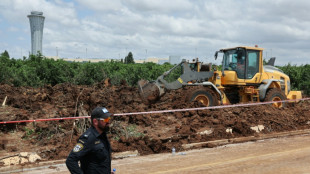Paramilitaries attack Port Sudan for first time: army
Sudanese paramilitaries on Sunday struck Port Sudan, the army said, in the first attack on the seat of the army-aligned government during the country's two-year war.
The Rapid Support Forces (RSF), battling the regular army since April 2023, have increasingly used drones since losing territory including much of Khartoum in March.
Army spokesman Nabil Abdallah said in a statement the RSF "targeted Osman Digna Air Base, a goods warehouse and some civilian facilities in the city of Port Sudan with suicide drones".
He reported no casualties and "limited damage".
Red Sea Military Region Commander Mahjoub Bushra told Sudan's news agency SUNA the assault lasted three and a half hours and involved 11 drones.
AFP images showed smoke above the airport area, about 650 kilometres (400 miles) from the nearest known RSF positions on Khartoum's outskirts.
Later Sunday, an AFP correspondent reported anti-aircraft fire intercepting another drone headed for an air base west of the Red Sea coastal city.
In the eastern border town of Kassala near Eritrea, some 500 kilometres south of Port Sudan, witnesses said three drones hit the airport a day after another drone targeted the same site for the first time.
Farther south in North Kordofan capital of El-Obeid, residents also reported drones overhead, followed by explosions and plumes of smoke.
In February, the army broke a nearly two-year paramilitary siege of El-Obeid, a key link to the vast western Darfur region which is under near-total RSF control.
At dawn Sunday, an AFP correspondent in Port Sudan said his home about 20 kilometres from the airport shook as explosions were heard.
The airport, a critical hub since the war began, closed temporarily but resumed operations at 5:00 pm (1500 GMT), a Civil Aviation Authority statement said.
- Drone warfare -
The paramilitaries led by Mohamed Hamdan Daglo are battling the regular army, headed by Sudan's de facto leader Abdel Fattah al-Burhan, in a devastating war that has killed tens of thousands and uprooted 13 million.
In the conflict's early days, the government relocated from Khartoum to Port Sudan, which until Sunday had been spared the violence.
UN agencies have also moved their operations to Port Sudan, where hundreds of thousands of displaced people have sought refuge.
The conflict has left Africa's third largest country effectively divided.
The army controls the centre, east and north, while the RSF has conquered nearly all of Darfur and parts of the south.
Lacking the army's fighter jets, the RSF has relied on drones for air power.
Sudanese analyst Hamid Khalafallah said the RSF has increasingly relied on long-range drones after the "strategic setback of losing Khartoum".
"Without changing their strategy, they risk being confined to Darfur," he told AFP.
Khalafallah said drones help the RSF "create panic and destabilise" northern and eastern cities such as Port Sudan.
- 'No safe place' -
Sudan's government has accused the United Arab Emirates of supplying the paramilitaries with advanced drones.
The UAE has long denied reports from UN experts, US politicians and international organisations that it provided support to the RSF.
Satellite imagery analysed by Yale University's Humanitarian Research Lab, which tracks the conflict, shows six advanced drones at the RSF-controlled Nyala Airport in Darfur.
In an April report, it said the Chinese-made drones "may be capable of long-range surveillance and strikes".
Saudi Arabia, which previously mediated truce talks, Sunday condemned RSF attacks "on vital facilities and infrastructure in Port Sudan and Kassala".
Egypt said the attacks undermine "efforts to restore stability" in the war-torn country.
Sunday's was the latest RSF drone attack on military and civilian infrastructure deep in army-held territory.
A retired Sudanese army general told AFP on condition of anonymity such attacks "serve to send a message" that "there is no safe place" for the RSF's rivals.
"Their other objective is to halt air traffic," he said, and to "impact the armed forces' supply chain".
I.al-Ghamdi--al-Hayat




